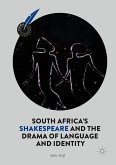Shakespeare in Cuba: Caliban's Books explores how Shakespeare is consumed and appropriated in Cuba. It contributes to the underrepresented field of Latin American Shakespeares by applying the lens of cultural anthropophagy, a theory with Latin American roots, to explore how Cuban artists ingest and transform Shakespeare's plays. By consuming these works and incorporating them into Cuban culture and literature, Cuban writers make the plays their own while also nourishing the source texts and giving Shakespeare a new afterlife.
Bitte wählen Sie Ihr Anliegen aus.
Rechnungen
Retourenschein anfordern
Bestellstatus
Storno









